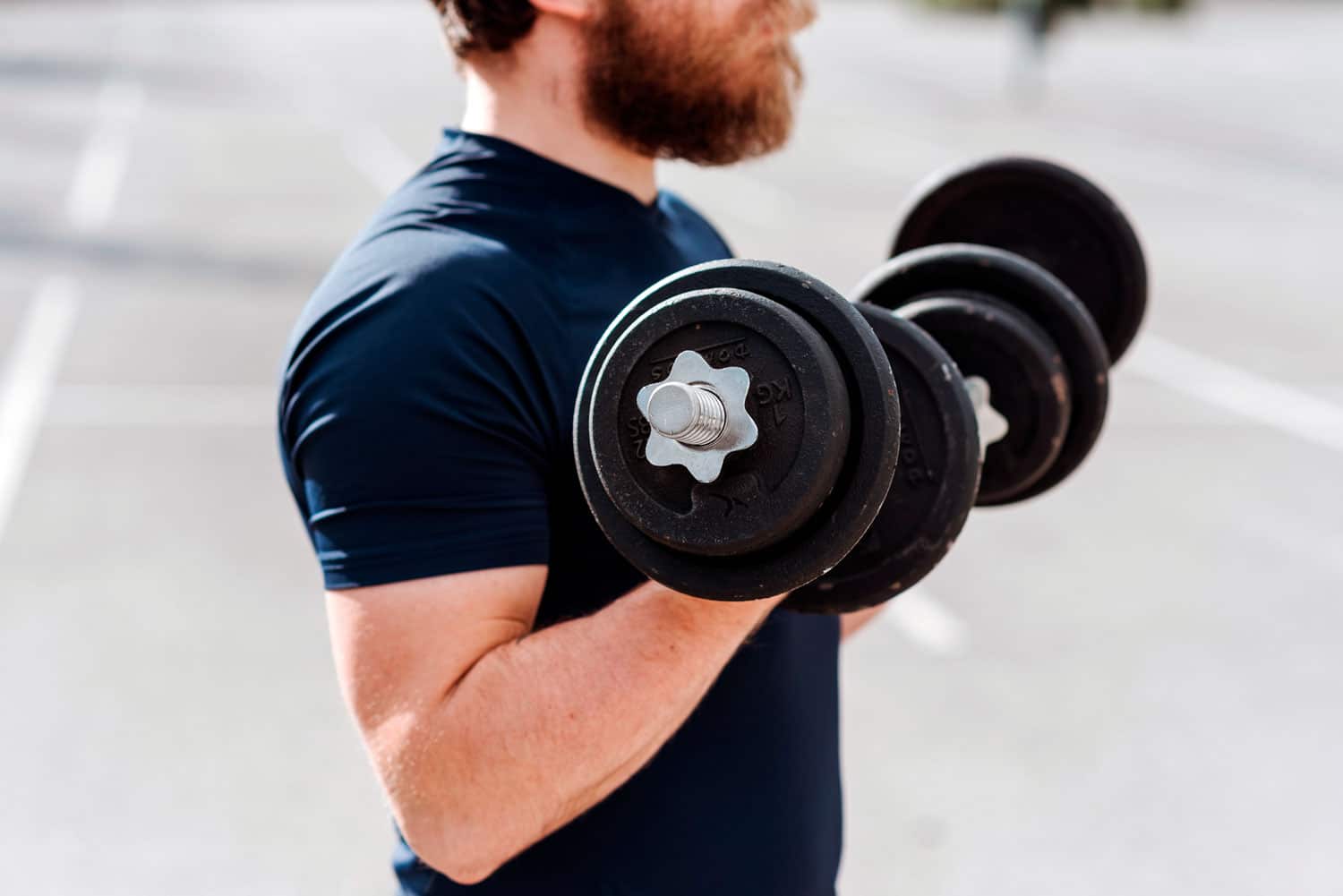Introduction
Maybe you’ve started noticing that you’re working out as hard as ever, but you’re not making any noticeable progress — or worse, losing muscle mass.
Men’s loss in their levels of testosterone as they grow older can also lead to depression and bad moods. That’s a normal part of the aging process, right?
Not necessarily. It’s not a foregone conclusion that you have to give in and lose muscle mass. That’s thanks to an increasing body of science on substances you can take as handy supplements. These substances occur naturally in your body and in healthy protein-rich foods like lentils, whole grains, and fish.
They are called peptides, and in this article you can learn how they boost muscle growth, and which are the best ones for you to take.
What Are Peptides?
Peptides are short chains of amino acids, which combine to form proteins, the building blocks of human life. The body uses amino acids, which are essential to life, to create protein it uses as fuel.
There are nine essential amino acids (histidine, isoleucine, leucine, lysine, methionine, phenylalanine, threonine, tryptophan, and valine.) These can’t be made by the body so must come from your diet. There are also nonessential amino acids that include cysteine and glutamine (which you have likely seen in supplement shops).
Combinations of these amino acids can yield a massive variety of substances that help us to perform very specific functions vital to our health.
Peptides can be thought of as an intermediate step between amino acids and proteins — short chains that are easily absorbed by your body. They are composed of fewer amino acids than proteins, so are simpler structures. They perform such tasks in the body as:
- Producing hormones, conveying important messages throughout your body
- Repairing damaged DNA as needed
- Building muscle tissue to keep it strong.
Naturally, it’s this last ability to strengthen and grow muscle that’s of interest to bodybuilders and athletes.
Diet is one way to absorb essential amino acids, which are present in meat, fish, and plant-based proteins like legumes. But as you grow older it can be harder to absorb the volume of peptides you need from diet alone, and it can be counterproductive to consume as many calories as that would take.
Taking peptides directly as a supplement can help your body produce its own hormones and compounds that promote bone and muscle growth, allowing you to continue performing at a high athletic level.

How Do Peptides Work?
Simply stated, peptides trigger messages and signals within your body to release hormones and carry out various essential functions. At the deepest cellular level, they instruct your body to perform such tasks as producing collagen and elastin (essential for youthful-looking skin). They also tell your body when to produce hormones. Hormones are your body’s messaging system; they regulate such essential parts of your life as stress, sexual function, and growth.
For example, stress hormones like cortisol can get in the way of losing belly fat and growing your muscle (they can also make you feel, well, stressed). Certain peptides can interfere with out-of-control cortisol production, lowering its levels and allowing your body to get out of its fight-or-flight mode. (They don’t do this directly, but modulate certain hormonal pathways and expressions). Less cortisol in your system then means your body can send its energy reserves and resources where they can be more helpful — like growing muscle. With cortisol levels lowered (to continue the example from above), your body can focus on better recovery after exercise. This is one important way peptides can benefit your muscle growth and make you look better: less belly fat means more visible abs, to name one obvious benefit. Other peptides can help boost your immunity and reduce inflammation, a benefit for athletes who seek to be both healthy and well-muscled (working out fights inflammation, too). Other peptides more directly speed up fat loss and muscle gain. These naturally-occurring molecules are at the deepest levels of your body’s ability to direct its resources, and it’s quite amazing to think they can be modulated via what we eat and consume.
Peptides can penetrate tissue. That’s why they are also popular ingredients in skin care, where they are used topically to boost collagen and skin elasticity. Taken orally or as injections, peptides’ tissue-penetrating quality allows them to go where they are needed, rapidly.
How Do Peptides Help Build Muscle?
Peptides for bodybuilding generally work by switching on the production of hormones that lead to hypertrophy — the all-important increase in muscle cells that gives you visible gains. They stimulate the release from your liver of a substance, insulin-like growth factor 1 (IGF-1), which in turn signals your body to amp up muscle cell size. But there are other ways they can help build muscle. For example:
- Peptides can reduce certain hormones that interfere with your ability to gain muscle
- Peptides can stop your body from processes that regulate its production of human growth hormone (HGH)
- Peptides can suppress your appetite and help fight inflammation and low immunity, which can get in the way of your ability to work out and make gains.
Many peptide supplements are derived from their natural food sources, which may include legumes, seeds like flax and hemp, and grains like wheat, as well as animal products like fish, milk, and eggs. These offer fast-acting, rapidly-absorbed, and concentrated versions of the substances that bodybuilders usually consume to increase their protein levels.
For more specific pathways that peptides target, read on!
What Are the Best Peptides for Bodybuilding or Muscle Growth?
The two most popular are probably growth hormone secretagogues (GHS) and growth hormone-releasing (GRHG) agonists.
While GHS peptides encourage the body to create and release its own natural HGH, growth hormone-releasing (GRHG) agonists can help promote muscle growth by encouraging more production of growth hormone and directing it to specific receptors; GRHG agonists also have a potential anti-cancer efficacy, to give you an idea of the intricacy of the human body’s interconnectedness.
But there are a few other fascinating peptides you might consider, alone or in a cocktail. Among them:
- Body-protecting compound 157 (BPC-157) is a peptide that can lead to improved wound healing, which can then lead to muscle growth (muscles growing, of course, by tearing and then healing themselves). This could have application in allowing athletes and gym rats to train harder and more consistently with less fear of injury and setback.
- Tesamorelin (GHRH peptide) stimulates the pituitary gland, to increase IGF-1 in a very powerful fashion.
- Ipamorelin works by suppressing somatostatin, a substance that blocks the body’s natural production of growth hormone.
- Amlexanox/TTA is a powerful anti-inflammatory, which can also suppress your appetite, as well as enhance your immunity. That means if you struggle with limiting your calories while still making gains, this particular peptide could help you achieve your bodybuilding goals while still feeling satiated.
Collagen peptides can be used to keep joints smooth and well-functioning, an essential support for muscle growth.
Amino acids can be combined in myriad ways, and therefore so can peptides. Scientists are constantly finding out new ways that these amino acids can be combined and the outcomes that combinations have on the body. It’s important to partner with a company that cares about the research behind its products, and their safety.

Difference Between Peptides, HGH, and Steroids
HGH is secreted by your pineal gland and encourages muscle growth. HGH doesn’t act in a 1:1 way, but, like other muscle-building peptides, encourages your liver to release IGF-1. IGF-1 boosts muscle — but too much can lead to a condition called acromegaly — which basically makes you look like Lurch from the Addams Family. Using HGH directly can lead easily to overdosing on the substance, which can lead to health problems of a severe nature.
Too much HGH can also promote certain cancers and lead to heart disease and diabetes, not to mention blood clots from the injections it requires. HGH is banned by the World Anti-Doping Agency, so even if you were tempted to use (or abuse) it, it’s not a good idea if you want to take part in bodybuilding competitions. Finally, while HGH may make your muscles look big, it may not actually improve your athletic performance. So in all, for reasons to do with ethics, health, and the law, it’s best to avoid HGH. Not only that, but consuming it directly can also interfere with your own production of HGH. Better to take substances like peptides which help your body make its own, via a natural process that your own body can regulate. Your body needs peptides to function; giving it the right ones to consume and transform into protein (and, yes, muscle) is a more natural process than simply consuming HGH (which is also banned in many countries, making it less of a possibility).
Steroids, in this context, are anabolic steroids. (These are different from the ones you might be prescribed if you have arthritis or lupus, which are corticosteroids; in the words of the U.K. National Health Service, these steroids are “a man-made version of hormones normally produced by the adrenal glands which are 2 small glands found above the kidneys.”) They are synthetic versions of testosterone.
Are There Side Effects to Peptides?
These are the early days of the peptide revolution. Any substance that affects your body’s hormones should be used with some degree of caution, as we may not yet fully understand how affecting the level of one substance cascades to others.
More research is needed to tell us if there are any significant side effects to peptide use. That said, peptides seem to be safer alternatives to HGH or steroids. The hope is that by telling the body to amplify its signal to create more hormones, rather than flooding it artificially with hormones, peptides will have fewer significant side effects than their rivals for muscle growth. Some users have reported no side effects at all, while others have reported side effects like water retention and some increase in blood sugar levels.
Peptides for Muscle Growth in Conclusion
Peptides are naturally-occurring chains of amino acids that your body needs to make proteins. Therefore, they present an exciting frontier for men who are getting older but still want to maintain their youthfulness and muscle growth. While more research is needed, the promise of peptides is that they offer a way to stimulate your own body’s natural processes, rather than flooding them with dangerous substances like synthetic testosterone, which runs the real risk of overwhelming your body’s ability to function.
Peptides perform essential functions in the body such as promoting wound healing, reducing inflammation, and lowering blood pressure, as well as increasing muscle growth. So scientists who study longevity and anti-aging substances are naturally intrigued. If you’re looking for a partner to help you stay stronger and even increase muscle as you age, get in touch with Men’s Revival. They base their treatment on the analysis of your specific blood levels of hormones, as well as your goals, so they can customize a plan that analyzes your unique endocrine and metabolic functions and brings you maximum gains.
Ready to take the next step?
If you’re experiencing symptoms of low T, reach out to our team to find out how we can help you.

